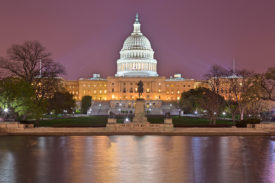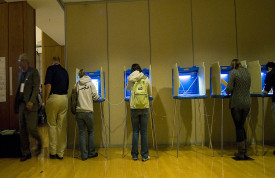Last time, I illustrated how the un-democracy of the US Senate hogties the Pacific Northwest. It radically underrepresents the most-populous, diverse, and innovative parts of the country, making it exceedingly difficult for the nation to adapt to the demands of a radically new global era by, for example, adopting sweeping new approaches to energy and climate policy. Unfortunately, that’s not the end of the negatives emanating from the design of the Senate.
Senate-induced gridlock in Washington, DC, erodes the public’s confidence in their ability to act collectively through institutions of democratic self-rule and to rise to the great challenges of the day. It gives government a bad name. As Peter Beinart argues in the March 1 edition of Time, this side-effect has pushed the United States into a vicious circle of governance failure: “From health care to energy to the deficit, addressing the U.S.’s big challenges requires vigorous government action. When government doesn’t take that action, it loses people’s faith. And without public faith, government action is harder still.” Conversely, “When government acts to solve problems, even if the solutions aren’t perfect, it breaks the vicious circle of political failure and mistrust.”
In fact, Beinart argues, when—as at present—the minority party is also the anti-government party, it’s actually in that party’s electoral interest to obstruct the passage of the majority party’s legislative agenda, even if the minority party does not disagree with it. By their behavior, they reinforce the notion that Washington, DC, is an epic failure, which voters tend to blame on the majority party, thus pushing elections toward the minority party.
One result of this dynamic is that Congress can change hands repeatedly, with even large majorities unable to pass their programs, because the rules so favor Senate minorities in general and small-state voters in particular. The public, unaware of the flawed design of US governance, personalizes blame on elected officials themselves, and on lobbyists and campaign money (both worthy of considerable blame!), and has its cynicism confirmed. It’s like a self-fulfilling prophecy. Mistrust of government has become deep and widespread in the United States, as the Demos Institute has documented extensively. And in many US states (though not necessarily in the Northwest), public trust in governing institutions is at or near record lows, a victim of a wretched economy and state and federal capitals that seem unable to rouse themselves to action.
The sad fact is, they can’t rouse themselves to action in Washington, DC, because the governing system was designed to resist action. That’s what “checks and balances” means: stop!
Thus, the flaws of the Senate’s design corrode public trust in government in general. Without public belief in our ability to rise to the daunting challenges we face, to act collectively through our democracy, the quality of self-governance goes into a vicious circle of cynicism, disaffection, and failure.
Next time, I’ll describe how the Canadian part of the Northwest ended up with a superior system.









Pete
I think there is a critical “l” missing from one of the words in the title of this article. At least, I don’t think that’s the kind of trust you intend to be talking about.
Eric Hess
Oh my! The classic typo. The post has been fixed. Many thanks.
Alan Durning
This post, composed a few weeks ago, seems ill-timed on the day that the US President signed a sweeping health-care reform package.But it’s basic point, if it seems party-pooper-ish, is as true as ever. One main reason the United States has lagged most industrial democracies in its health policies is that the US Senate would not pass bills already approved by the House. Remember, the House passed a comprehensive climate-energy-green-jobs bill called Waxman-Markey in June 2009. It passed health care reform in October. All the subsequent drama has been about the Senate.I’d like to see a “what if” history of the US, if every bill that passed the House had become law. How different would the nation be? In most cases, I believe, the results would have been much better. I welcome counterexamples!
Alex
“The sad fact is, they can’t rouse themselves to action in Washington, DC, because the governing system was designed to resist action. That’s what “checks and balances” means: stop!”I would argue that our government was designed with checks and balances so that actions not agreeable to a majority of our representation and/or not allowed by the Constitution could be stopped. In other words, “good actions” were meant to succeed. The reasons politicians can’t be roused to action are several, but the primary reasons are (a) people genuinely disagree, no matter how stupid or stubborn (i.e. traditionalist) we think they are, and (b) almost all issues relate to jobs and money, and therefore have persuasive lobbyists fighting progress in the name of job conservation and the use of capital for job creation.
VI
I think one perspective missing from this article is a serious look at whether the purpose of the Senate rules is to fundamentally slow down government action, and to increase public confidence that things won’t change too quickly. It’s the same argument against overturning Roe vs. Wade – people build their lives on the rules staying consistent. We like to think of “getting things done” as the purpose of our government, but there are serious ideas that the success of the U.S. model is predecated on the fact that our government slows, blocks, and stymies these sorts of endeavours, and that this is a structural bulwark of liberty. The downside is that even if it does protect against tyrrany of the majority, it also protects inherited injustice – stopping forward looking environmental and health protection for the many against the privelage of the few.In my opinion, the previous feature on proportional representation illuminates a far greater threat than the fillibuster, and even has a Canadian counterpart – PEI gets 20 times the representation of BC.